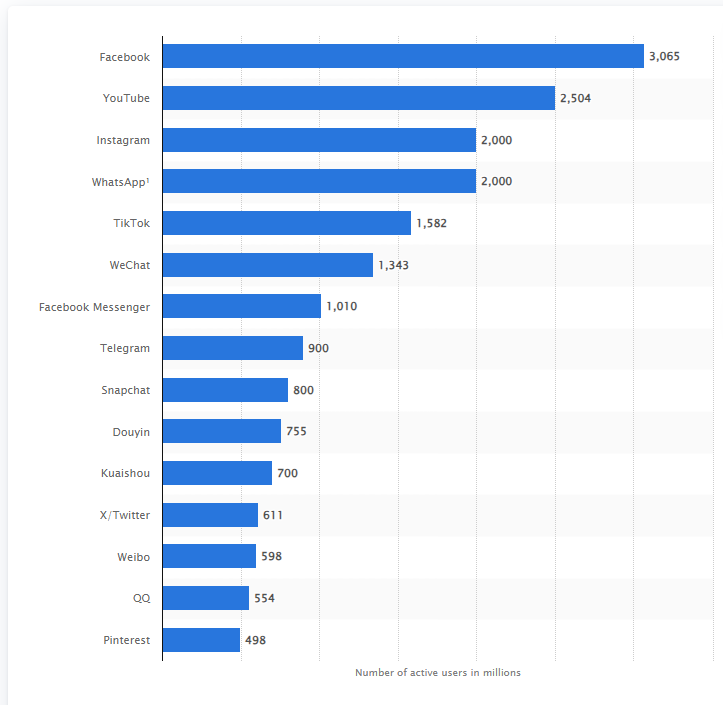Introduction
Welcome to our comprehensive guide on social media management. In today’s digital age, effective social media management is crucial for businesses of all sizes. Whether you are a small business owner or a marketing professional, mastering social media can significantly boost your online presence and drive your business forward. In this article, we’ll delve into essential tips, strategies, and best practices to help you excel in social media management across platforms like Facebook, Instagram, Twitter X, LinkedIn, TikTok, and more.
The role of a social media manager
Social media managers are responsible for developing the strategies that maintain and grow a social presence, in addition to administrative and team development tasks. Any given day might involve content creation, campaign strategies, career planning, reporting, and the list goes on.
Being successful in such a fluid role requires a unique set of skills, including but not limited to:
- Adaptability
- Organization
- Creativity
- Curiosity
- Critical thinking
Combined, these talents help social media professionals manage the evolving needs of this business-critical channel.
Main pillars of social media management
Making your mark in the social media landscape requires a nuanced strategy involving various components. From creating compelling content and posting it at the right time to using ads smartly and understanding your brand performance through analytics, a lot goes into sculpting your brand’s online identity.
So, let’s explore these aspects, see why they matter, and explore how you can effectively apply them to successful social media management.
Content creation management
Social media content creation and strategy are the foundation of social media management. They offer a chance to form lasting bonds with your audience. Crafting compelling content involves understanding your audience’s preferences, for instance, creating engaging narratives and selecting the most effective content formats. When done right, this component not only helps cut through the noise but also aligns with the rise in demand for personalized and relevant marketing content, which grew by 1.5 times in 2023.
Paid advertising management
Paid advertising is a strategic extension of organic efforts and is pivotal in reaching a broader audience. It includes implementing paid social media campaigns to amplify the impact of content and achieve specific marketing objectives. Effective paid advertising is a key driver of brand visibility and reach, from sponsored posts to targeted campaigns.
💡 Good to know: By using tools such as Rsquare Media’s Social Advertising, you can get better ad performance with AI-automated optimizations.
- Understanding Social Media Management
Social media management involves overseeing and executing a strategy across various social media platforms to engage with your audience, build your brand, and drive sales. It includes content creation, scheduling posts, analyzing performance metrics, and engaging with followers. Popular social media sites like Facebook, Instagram, Twitter, LinkedIn, TikTok, and Pinterest each have unique features and user demographics, making it essential to tailor your approach to each platform.
Effective social media management is more than just posting content. It involves understanding your audience, creating engaging content, monitoring engagement, and analyzing performance to optimize your strategy. Social media platforms offer a range of tools and analytics to help manage these tasks efficiently.
- The Importance of Social Media Management
Effective social media management helps you maintain a consistent brand voice, reach a wider audience, and build meaningful customer relationships. By actively managing your social media presence, you can enhance your reputation and establish trust with your audience. Additionally, it allows you to stay competitive in your industry and leverage social media trends to your advantage.
Why is Social Media Management Crucial?
- Brand Awareness: Social media platforms provide a stage to showcase your brand’s personality and values. Consistently posting relevant content can increase your brand’s visibility and reach.
- Customer Engagement: Direct interaction with your customers through comments, messages, and posts helps build a loyal community around your brand.
- Traffic and Conversions: Effective social media strategies can drive traffic to your website, increasing the chances of conversions and sales.
- Market Insights: Social media provides valuable insights into customer preferences and behaviors, helping you tailor your marketing strategies.
- Reputation Management: Managing your online reputation through social media can prevent crises and maintain a positive image of your brand.
- Social Media Management Tips
Here are some practical social media management tips to help you get started:
- Consistency is Key: Regular posting keeps your audience engaged and helps you stay top-of-mind. Use scheduling tools; for example, you can use Hootsuite or Buffer to plan your posts.
- Know Your Audience: Tailor your content to meet the preferences and interests of your target audience. Use analytics tools on platforms, for example, Facebook Insights and Instagram Analytics to better understand your audience.
- Utilize Analytics: Use social media analytics tools to track performance and adjust your strategy accordingly. Tools like Google Analytics, Sprout Social, and Twitter Analytics provide valuable insights into your social media performance.
- Engage with Your Audience: Respond to comments and messages promptly to foster a sense of community. Engaging with your audience on platforms like Twitter and Instagram can build strong relationships and encourage loyalty.
- Stay Updated: Keep up with the latest social media trends and algorithm changes. Follow industry blogs and news sites like Social Media Examiner and HubSpot for updates.
- Crafting a Social Media Marketing Strategy
A solid social media marketing strategy is the foundation of effective social media management. Here’s how to create one:
- Set Clear Goals: Define what you want to achieve with your social media efforts, such as increasing brand awareness, generating leads, or driving sales. Make your goals SMART (Specific, Measurable, Achievable, Relevant, Time-bound).
- Identify Your Target Audience: Understand your audience and what they care about. Create buyer personas to guide your content creation and marketing efforts.
- Choose the Right Platforms: Focus on the social media platforms your target audience uses the most. For example, LinkedIn might be more effective than Instagram if you’re targeting professionals.
- Create a Content Calendar: Plan your posts to ensure a consistent schedule. Use Trello or Asana to organize your content calendar and collaborate with your team.
- Measure and Adjust: Review your performance metrics regularly and tweak your strategy. Conduct regular audits of your social media accounts to identify areas for improvement.
- Social Media Reputation Management
Managing your online reputation is a critical aspect of social media management. Here’s how to do it effectively:
- Monitor Mentions: Monitor what people are saying about your brand online. For example, use tools like Mention, Brand24, or Google Alerts to monitor your brand’s mentions across the web.
- Respond to Feedback: Address both positive and negative feedback promptly and professionally. Responding to reviews on Yelp, Google My Business, and Facebook can show that you value customer feedback.
- Showcase Positive Reviews: Highlight positive reviews and testimonials to build credibility. Share customer success stories on social media to build trust with potential customers.
- Be Transparent: Honesty and transparency go a long way in building trust with your audience. Admit mistakes and explain the steps you’re taking to rectify them.
- Choosing a Social Media Management Company for Small Business
Hiring a social media management company can be a game-changer for small businesses. Here’s what to look for:
- Experience and Expertise: Choose a company with a proven track record in managing social media for small businesses. For instance, the case studies and testimonials demonstrate their success.
- Customized Solutions: Look for a company offering tailored strategies to meet your needs. Avoid one-size-fits-all solutions and seek personalized approaches.
- Transparency: Ensure the company provides clear and regular reports on your social media performance. Transparent reporting helps you understand the ROI of your social media efforts.
- Cost-Effectiveness: Find a company that offers quality services at a reasonable price. Compare pricing packages and consider the value you’re getting for your investment.
- Social Media Platforms Overview
Different social media platforms offer unique opportunities for engagement and growth. Here’s a brief overview of the most popular platforms:
Facebook: With over 2.8 billion monthly active users, Facebook is ideal for reaching a broad audience. Use Facebook Pages for businesses, Groups for community building, and Ads for targeted advertising.
Instagram: Known for its visual appeal, Instagram is great for brands with strong visual content. Use Instagram Stories, IGTV, and Instagram Shopping to engage with your audience and drive sales.
Twitter/X: Twitter is perfect for real-time updates and customer service. Utilize Twitter Chats, Twitter Lists, and Twitter Ads to enhance your presence and engage with your audience.
LinkedIn: LinkedIn is the go-to platform for B2B marketing and professional networking. Use LinkedIn Pages, LinkedIn Groups, and LinkedIn Ads to connect with professionals and decision-makers in your industry.
TikTok: With its rapidly growing user base, TikTok is ideal for reaching younger audiences. Create engaging short-form videos and participate in trending challenges to increase your visibility.
Pinterest: Pinterest is a visual discovery engine that can drive traffic to your website. Use Pinterest Boards, pins, and ads to showcase your products and content.
YouTube: As the second largest search engine, YouTube is essential for video content. Create engaging video tutorials, product demos, and vlogs to attract and engage your audience.

- Advanced Social Media Management Tips
- Leverage Influencer Marketing: Collaborate with influencers to reach a larger audience. Influencers can help amplify your message and build credibility with their followers.
- Run Contests and Giveaways: Engage your audience with contests and giveaways. These activities can boost engagement, increase followers, and generate excitement around your brand.
- Use Hashtags Effectively: Research and use relevant hashtags to increase the visibility of your posts. Platforms like Instagram and Twitter thrive on hashtag usage.
- Incorporate User-Generated Content: Encourage your followers to create and share content related to your brand. User-generated content can build community and trust.
- Optimize Your Profiles: Ensure your social media profiles are complete and optimized for search. Use keywords in your bio and include links to your website.
- Long-Tail Keyword Variations and Synonyms
To avoid keyword stuffing and ensure natural language flow, incorporate long-tail keyword variations and synonyms. For instance:
- Social Media Management Tips: “Tips for managing social media effectively,” “Best practices for social media management.”
- Social Media Reputation Management: “Online reputation management for social media,” “Managing your brand’s reputation on social media.”
- Social Media Management Company for Small Business: “Top social media management firms for small businesses,” “Best social media agencies for small businesses.”
- Social Media Marketing Strategy: “Creating an effective social media marketing plan,” “Developing a winning social media strategy.”
Sharing real-life examples can illustrate the effectiveness of your social media management strategies. Here are a few case studies:
Case Studies: Real-World Success with Social Media Strategies

Case Study 1: Sweet Lady Jane – Small Business Growth on Instagram
Background: Sweet Lady Jane, a well-known bakery based in Los Angeles, aimed to boost its visibility and sales through Instagram.
Strategy: The bakery focused on showcasing its delectable products, sharing engaging behind-the-scenes content, and interacting with its community. They implemented a consistent posting schedule and used relevant hashtags to reach a broader audience.
Results: By leveraging Instagram’s visual platform, Sweet Lady Jane saw a dramatic 300% increase in their follower count. This enhanced online presence translated to a 50% increase in sales over six months, demonstrating the power of effective social media marketing for small businesses.
Case Study 2: Nest Labs – Reputation Management on Twitter
Background: Nest Labs, a prominent home automation company, encountered negative feedback on Twitter following an issue with one of their smart home products.
Strategy: The company responded promptly and transparently to the concerns raised. They engage with customers directly on Twitter, addressing their issues publicly and it will offer solutions to the problem.
Results: Nest Labs’ proactive approach to handling criticism led to a 20% increase in positive mentions and significantly improved customer satisfaction. This case highlights the importance of timely and transparent communication in managing a brand’s reputation on social media.
Case Study 3: HubSpot – LinkedIn Marketing for B2B
Background: HubSpot, a leading inbound marketing and sales platform, aimed to enhance its B2B marketing efforts through LinkedIn.
Strategy: HubSpot utilized LinkedIn to connect with industry professionals and share valuable content related to marketing and sales. They actively participated in LinkedIn Groups and ran targeted LinkedIn Ads to reach their desired audience.
Results: The company successfully generated 50 high-quality leads and saw a 40% increase in website traffic within three months. HubSpot’s strategic use of LinkedIn for content marketing and targeted advertising demonstrates its effectiveness in driving B2B engagement and lead generation.
- Tools for Effective Social Media Management
Using the right tools can make managing your social media much easier. For instance, here are some top options to check out:
- Hootsuite: Manage all your social media accounts in one place, schedule posts, and track analytics.
- Buffer: A user-friendly tool for scheduling posts, analyzing performance, and managing multiple accounts.
- Sprout Social: Offers advanced analytics, social listening, and team collaboration features.
- Canva: Create stunning visuals for your social media posts with easy-to-use design tools.
- BuzzSumo: Discover trending content and analyze what’s working for your competitors.
- Future Trends in Social Media Management
Staying ahead of trends is crucial for long-term success. For instance, here are some future trends to watch:
- Increased Use of AI: Artificial intelligence will play a larger role in social media management, from chatbots for customer service to AI-driven content creation.
- Video Content Dominance: Video content will continue to dominate social media, with platforms like TikTok and Instagram Reels leading the way.
- Social Commerce: The integration of e-commerce with social media platforms will grow, making it easier for users to shop directly from their social media feeds.
- Augmented Reality (AR): AR features will enhance user experiences, offering interactive and immersive content.
- Data Privacy Concerns: With data privacy scrutinized more closely, social media platforms must prioritize user data protection and transparency.
- The Role of Content Creation in Social Media Management
Content creation is at the heart of social media management. For Instance, here are some tips for creating engaging content:
- Visual Content: To capture attention, use high-quality images, graphics, and videos. Platforms like Instagram and Pinterest thrive on visual content.
- Storytelling: Tell compelling stories that resonate with your audience. Share behind-the-scenes content, customer testimonials, and brand stories.
- Interactive Content: To engage your audience, create polls, quizzes, and interactive posts. In other words interactive content can boost engagement and provide valuable insights.
- User-Generated Content: Encourage your followers to create content related to your brand. Share user-generated content to build community and trust.
- Consistency: To keep your audience engaged, maintain a consistent posting schedule. Use a content calendar to plan and organize your posts.
- Measuring Social Media Success
Measuring your success is essential to ensure your social media efforts are effective. For instance, here are some key metrics to track:
- Engagement: Track likes, comments, shares, and interactions therefore allowing you to gauge how your audience engages with your content.
- Reach: Measure the number of people who see your posts to understand your brand’s visibility.
- Followers: Monitor your follower growth to see how your audience is expanding.
- Conversions: Track the number of leads, sales, or sign-ups generated from your social media efforts.
- Traffic: Measure how much traffic your social media channels drive to your website.
- Building a Community on Social Media
Building a community around your brand can enhance your social media presence. For instance, here are some tips for fostering community:
- Engage Regularly: Respond promptly to comments, messages, and additionaly mentions to show your audience that you value their interaction.
- Create a Group: Consider creating a Facebook Group or LinkedIn Group to build a community of like-minded individuals.
- Host Events: To engage with your audience in real-time, host live events, webinars, and Q&A sessions.
- Encourage User Participation: Ask your followers for their opinions, feedback, and ideas. User participation can increase engagement and foster a sense of community.
- Show Appreciation: Acknowledge and appreciate your followers. In other words you should highlight user contributions and show gratitude for their support.
- SEO Optimization Goes hand in hand with social media and visibility
-
- Content Strategy: SEO and social media management rely heavily on high-quality content. Creating valuable, relevant, and engaging content is essential for attracting and retaining an audience, whether it’s for improving search engine rankings or driving social media engagement.
- Keyword Research: Understanding and utilizing keywords is crucial in both fields. In other words, SEO keywords help optimize content for search engines, making it easier for users to find your website. In social media management, keywords and hashtags enhance the visibility of posts, helping content reach a broader audience.
- Audience Engagement: SEO and social media aim to engage and build relationships with audiences. SEO focuses on attracting users through organic search and providing a positive user experience. At the same time, social media management involves direct interaction with followers, responding to comments, and fostering a community around the brand.
- Analytics and Metrics: Data analysis is vital for SEO and social media management. Monitoring performance metrics such as traffic, engagement rates, conversion rates, and user behavior helps refine strategies and achieve better results.
- Brand Awareness: SEO and social media both contribute significantly to brand awareness. SEO ensures the brand appears in search engine results, increasing visibility and credibility. On the other hand, social media promotes the brand through various platforms, engaging with users and creating a recognizable online presence.
By integrating SEO and social media strategies, businesses can create a cohesive online presence that maximizes visibility, engagement, and conversion rates, ultimately driving growth and success.
Overall, if you are still wondering, “How do I manage social media profiles?” Reach out to Rsquare Media today.
Social media management is both an art and a science to manage social media accounts. Your data can give you a good idea of how to spend your resources—in terms of money and time—but social moves fast. However, the platform delivering results today might take a dip tomorrow.
Diversifying your network strategy is a reliable way to ensure you’re ready for whatever challenges are thrown at you. An algorithm update on one platform is less of a shock to the system if you have a well-maintained presence across the social landscape.
This is where a social media management tool becomes a must-have. Posting natively (logging into each social network individually to post) across social media profiles is a huge time commitment. It becomes more than a full-time job after factoring in all the engagement and monitoring.
Tools like Sprout help businesses scale social operations sustainably. Publishing workflows support network customization while minimizing risk. After all, managing quality control is much harder when your team is running socially natively.
Mastering social media management is an ongoing process that requires dedication, creativity, and strategic thinking. After all that, following the tips and strategies outlined in this article, you can enhance your social media presence, build a strong online reputation, and achieve your business goals. Consistency, engagement, and continuous improvement are the keys to success. Stay updated with the latest trends, leverage the right tools, and adapt your strategies to meet the evolving needs of your audience.
Elevate your brand’s social media presence with expert strategies and management solutions. Learn how real-time monitoring, engaging content, and effective influencer collaborations can drive your success online. For tailored social media strategies and a free consultation, visit Rsquare Media today!



